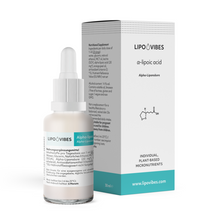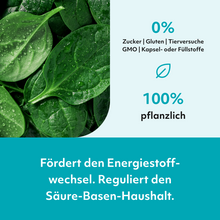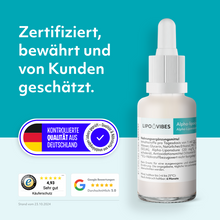Alpha-Lipoic Acid Drops – Liposomal with High Bioavailability
Our alpha-lipoic acid drops contain liposomal alpha-lipoic acid, which offers improved bioavailability compared to traditional forms. Alpha-lipoic acid is a natural antioxidant that supports cellular energy metabolism. The liposomal encapsulation of our product promotes better absorption by the body and optimal utilization of the active ingredient.
What is Alpha-Lipoic Acid?
Alpha-lipoic acid (ALA) is a natural substance found in the cells of many organisms. It is important for energy metabolism because it helps convert nutrients into energy. Alpha-lipoic acid is both water- and fat-soluble, allowing it to act in different parts of the cell.
Due to these properties, alpha-lipoic acid is often referred to as an antioxidant. It may help protect cells from oxidative stress. Because of its versatile functions, alpha-lipoic acid is commonly used as a dietary supplement.
LipoVibes Alpha-Lipoic Acid: Sourced from Controlled Origins
Our alpha-lipoic acid is produced under strictly controlled conditions to ensure the highest purity and quality. We use state-of-the-art processes to produce the active ingredient in pharmaceutical quality, ensuring consistently high quality and safety for our liposomal drops.
This controlled manufacturing process results in a pure product without unwanted impurities or additives. The alpha-lipoic acid in our LipoVibes drops meets the highest standards and is regularly tested by independent laboratories for purity and efficacy.
Alpha-Lipoic Acid: Effects and Benefits
Alpha-lipoic acid is a natural coenzyme that plays a key role in cellular energy metabolism. It acts as an antioxidant and works in both water- and fat-soluble environments, which helps protect cells from oxidative stress. Alpha-lipoic acid works closely with vitamins C and E to strengthen cellular defense mechanisms.
The liposomal form of LipoVibes alpha-lipoic acid provides particularly high bioavailability. Thanks to the special LipoMolecule technology, the active ingredients are surrounded by a lipid shell similar to the cell membrane. This allows for better absorption by the body and more efficient use than traditional forms. This advanced formulation enables precise dosing and supports optimal utilization in the body.
Potential effects of alpha-lipoic acid at a glance:
- Supports energy production in cells
- Antioxidant effect in both water- and fat-soluble environments
- Regenerates other antioxidants such as vitamin C, vitamin E and glutathione
- Binds to and eliminates heavy metals
- Supports glucose uptake and improves insulin sensitivity
- Protects and supports nerve cells and brain function
- Contributes to cardiovascular and vascular health
- Promotes liver health and detoxification processes
- Supports skin health and cell regeneration
- Helps with neuropathic pain
- Strengthens the immune system
Alpha-Lipoic Acid and Diabetes
Alpha-lipoic acid (ALA) is gaining increasing attention for supporting individuals with type 2 diabetes. It can improve insulin sensitivity by enhancing glucose uptake into cells, thus contributing to blood sugar regulation.
Additionally, alpha-lipoic acid acts as a powerful antioxidant that neutralizes free radicals and combats oxidative stress, which may help prevent complications such as diabetic neuropathy.
Studies suggest that ALA can relieve symptoms of diabetic neuropathy by supporting nerve function and reducing inflammation.











